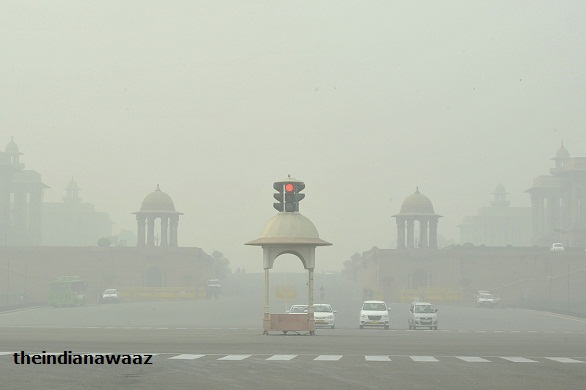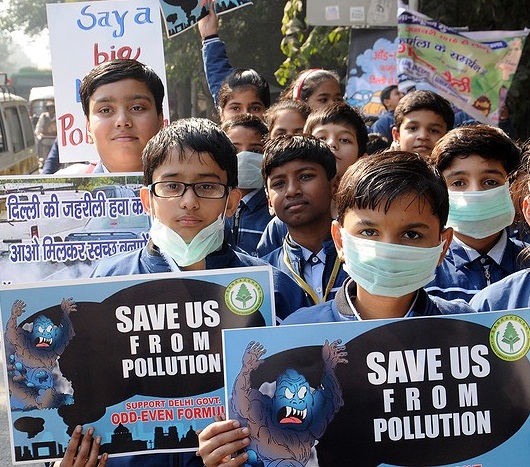Last Updated on November 3, 2019 3:27 pm by INDIAN AWAAZ

Air quality deteriorated and entered the severe category
CMs of Delhi, Punjab and Haryana called for urgent intervention by Centre to develop and implement a joint plan for a “permanent” solution to the problem
WEB DESK/ AMN / New Delhi
The air quality in the Delhi-NCR region has deteriorated and entered the severe category. The situation is likely to continue for the next two to three days.
Director-General of India Meteorological Department, Dr Kuldeep Srivatsava said due to rainfall, moderate fog shrouded the Delhi-NCR region today.
Meanwhile, the Delhi government is scheduled to start the odd-even scheme in the capital from tomorrow. The aim is to reduce pollution due to vehicular traffic.
According to the government air quality monitor, the air quality index (AQI) in Bawana was recorded at 999 in Jahangirpuri, Rohini, Sonia Vihar, Shahdara, Okhla, Major Dhyan Chand Stadium, Anand Vihar, Punjabi Bagh, Pusa, Mandir Marg, Mundka, Sriniwaspuri and JNU. Other places also crossed the 900-mark.
A day earlier, weather experts had said there is a significant improvement in wind speed and it will increase gradually. Winds gusting up to 20-25 kilometres per hour are likely in the region from Sunday to Tuesday, they said.

Scattered rainfall in Punjab, Haryana, Rajasthan and Delhi is likely on November 7 and November 8 under the influence of Cyclone Maha and a fresh western disturbance, the weather office said. This rainfall, however light, will be significant in terms of reducing the effect of stubble burning, and will wash away pollutants, they said.
Even as the blame game continued over failure to check the toxic haze, the chief ministers of Delhi, Punjab and Haryana on Saturday called for urgent intervention by the Centre to develop and implement a joint plan for a “permanent” solution to the problem.
Delhi’s Deputy Chief Minister Manish Sisodia accused Union Environment Minister Prakash Javadekar of postponing meetings with state environment ministers thrice, on September 12, October 17 and on October 19, saying either he has no time or does not consider treating the national capital’s poor air quality a priority.
He also claimed that with the Centre making 63,000 machines to stop stubble burning available in two years, it might take 50-60 years to implement the programme and asked “what should the people of Delhi-NCR do” during this period.
Over 22,000 cases of stubble burning had been witnessed in Punjab and more than 4,200 incidents in Haryana in the recent days, officials said.
In a crackdown on violators, authorities arrested 38 people including a director and three engineers, from sites of five real estate groups in Noida and Greater Noida for carrying out construction activities despite the ban. The South Delhi Municipal Corporation also issued four challans of Rs 5 lakh each to construction companies involved in the ongoing development work in Pragati Maidan.
On Friday, the Supreme Court-mandated Environment Pollution (Prevention and Control) Authority declared the public health emergency, following which the Delhi government decided to shut all schools. The EPCA also banned construction activities in Delhi-NCR till November 5.
All government and private schools up till Class 12 in Noida and Greater Noida have also been closed till November 5.
The Gautam Buddh Nagar administration said the decision has been taken as the levels of particulate matter 2.5 and 10 have been excessive in the air since Diwali, resulting in a major dip in the overall air quality.
UN Chief urges Asian countries to reduce use of coal to mitigate climate change
“Transport vehicles like buses and minibuses, which a lot of schools use to ferry children, are a major contributor of PM 2.5 and PM 10. The movement of such vehicles in the city now could aggravate the situation,” District Magistrate B N Singh said in a written order. “Hence, it is ordered that all schools up till Class 12 in Gautam Buddh Nagar will remain closed on November 4 and 5,” he said.
The odd-even road rationing scheme is also set to kick off from November 4 with even private CNG vehicles not exempt this time. Cab aggregators Ola and Uber have deactivated surge-pricing for the 12-day duration of odd-even. Two-wheelers that form around 88 per cent of total registered vehicles on the city roads are exempt.
An AQI between 0-50 is considered “good”, 51-100 “satisfactory”, 101-200 “moderate”, 201-300 “poor”, 301-400 “very poor”, and 401-500 “severe”. Above 500 is “severe-plus or emergency” category.
